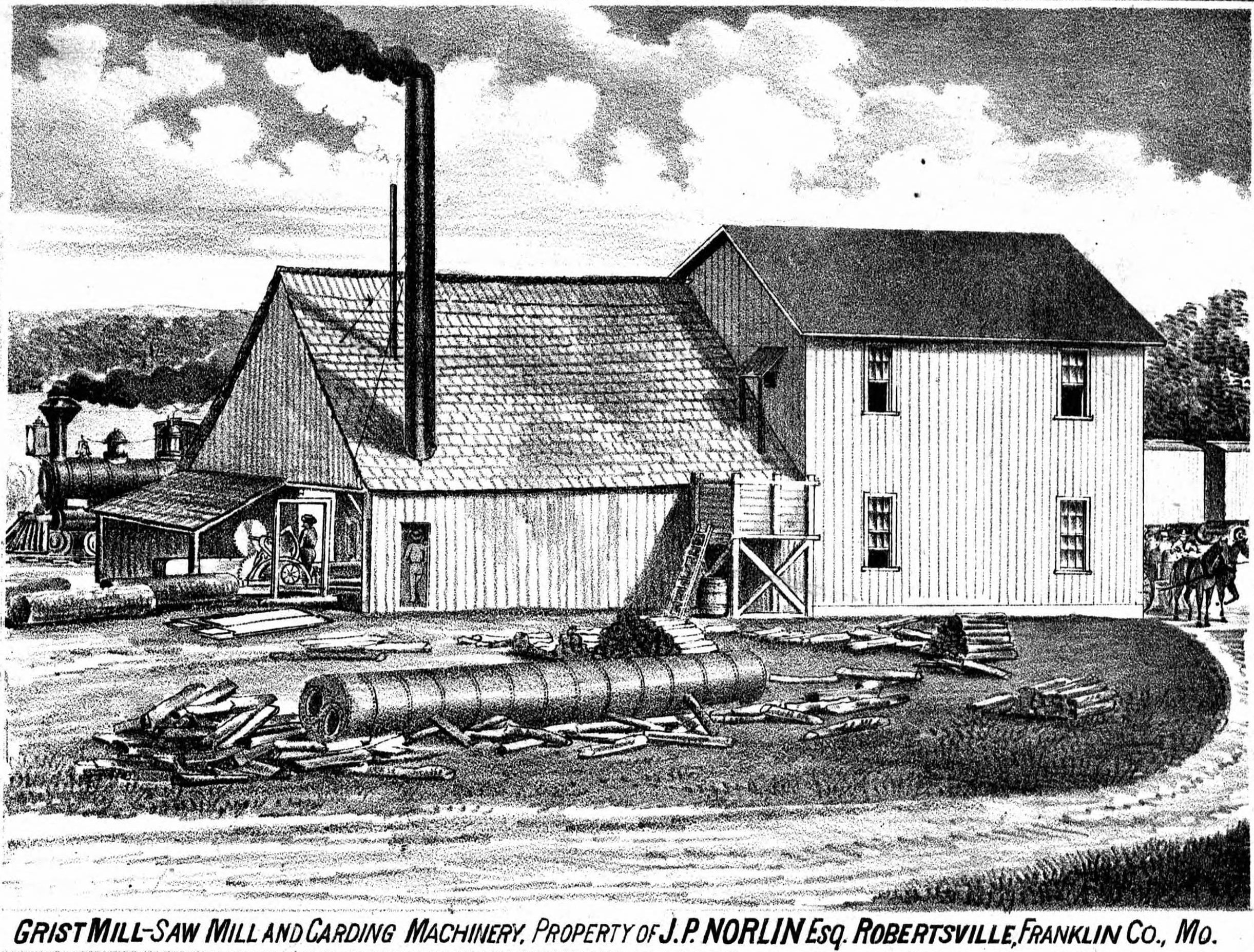franklin county mo 1878 plat: part 3
published from the public domain.
previous page here

grist mill, saw mill, and carding machinery property of jp norlin esq., Robertsville, Franklin County, MO
HISTORY OF FRANKLIN COUNTY—Continued.
EARLY MANNERS, CUSTOMS AND AGRICULTURAL IMPLEMENTS, ETC.
Our fathers after the flesh and in civilization, were as hospitable, and as sociable a people as ever lived. If a neighbor took sick, he was watched over as a brother ; and if his sickness was prolonged, his crops were looked after and his wood cut and hauled, if in winter. If a deer was killed, the first thing done was to divide with the neighbors. If a house was to be raised, men would go for ten and fifteen miles to assist, and their wives would often accompany them, for our mothers were as sociably inclined as their lords ; and a better, purer, or more virtuous class of women never lived, than the pioneer ladies of this country. A log-rolling was an event in the period to which log-rollings belonged ; and while the men rolled together and burned logs, the women managed to have a “quilting” at the some time and place, when enjoyment peculiar only to those good old days reigned supreme.
In those days the traveler was never charged, even if he remained for weeks. Such a thing as making bills for lodging and other accommodations of the kind was unknown. Men were then valued alone for I their personal merits, and property did not draw the lines that are now separating the rich from the poor. If a man was honest and upright, it formed a passport into the best society. Very little paper was used in common business transactions, and the man that did not keep his word, was simply ostracised from society and frowned down by all honest men ; and if men were now put more on their honor and less on their legal responsibilities, society would free itself from many common vices. If ever we reach a period in the future of our country when society shall stand entirely on a property basis, the fundamental virtues laid down by our fathers and in which the very constitution of the nation has its life, the principles of our institutions will perish, and the government, itself drift from an aristocracy to a monarchy.
Our fathers and mothers of the former days, now gone like the face of the country which they settled, were a people who worshiped God amid the green groves of God’s planting; with no vaulted roofs to catch and roll back their anthems, but the beautiful foliage over their heads. They honored and revered the Christian religion, before the fine sophistries of the origin of matter and the correlation of forces were over dreamed of Preachers then administered the word of life for the love they bore to their kind, and went from settlement to settlement preaching the cause of Christ, with little or no compensation, and it was a day when scandals among clergymen were unheard of.
The school-room was as simple of its kind, as was the log cabin in which the children were reared. Slabs and puncheons hewed with the broad-axe, with legs inserted, answered for seats. For a window, a log was removed in whole or in part from one side of the house, and a rude frame inserted, covered over with oiled paper, through which the light was filtered in winter days ; eight hours were taught for a day, and the birch was freely applied when necessary. They acted on the motto : " Spare the rod and spoil the child." Scholars were generally taken as far as the “rule of three” (proportion) in arithmetic, and learned to read and spell, when their education, as a role, was considered good, if not complete.
It is impossible to draw at this day a picture of the early history and social conditions that characterized the people of whom we write in such a manner as to be clearly intelligible to those who know nothing of flamer times by experience. The character of the people seems to have been assimilated, in certain respects, to the scenes and likeness of nature with which they were surrounded, and with which every feature of their natures was brought into sharp and constant contact. The county was then a wild scene of beauty and freshness. Strange beautiful flowers carpeted the earth ; the trees of the forest were tall and majestic; the waters of the streams bright and clear, and everywhere creation wore the impress that the Creator gave ere it was marred by the ruthless hand of civilization. In this mold their emotional and moral susceptibilities were impressed and cast, and every lineament of character was marked and clear. They were men of strong arms, strong emotions, attachments and character. They were generous, high-spirited, and quick to resent an insult or repel an intentional injury. Most of them have now passed away. Their work has been done, and they did it well. They subdued the country-wild when they entered it-and prepared the way for the advancement of our civilization, which it is hoped will continue to preserve the principles and virtues handed down from a former generation.